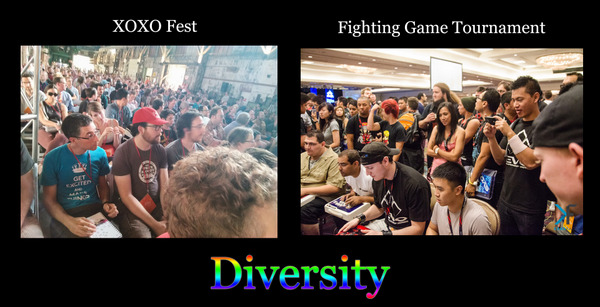Gaming and "gamers" are more alive than ever. The gamer identity is something for people who are games enthusiasts, people who see gaming as one of their primary free time pursuits, people who not only play a lot of games, but read about gaming, read the gaming news, read critiques, and also socialize with other gamers.
This definition does not preclude women from being gamers, it does not preclude black people, it does not preclude older people, it does not preclude any human being from claiming the gamer identity. I have known people from all walks of life who are gamers and it has never been an issue.
I think the reactionary, and ultimately self defeating, articles we saw recently declaring "gamers are dead", came from a very frustrated games press. They have a lot to be stressed out about. Making money is as difficult as ever as a games writer, with online content all being given out for free and having to rely on ads, which are often time being blocked by a larger percentage of the readership, in order to fund everything, from the web hosting, to the payroll, to the taxes, etc.
Not only is making money writing about games very difficult, but now Youtubers, who seem to be immune to any criticism over ethics or getting paid to cover games, seem to be almost replacing traditional print as taste makers. If you look at the the new Steam curators lists, TotalBiscuit, a prominent Youtuber, has far and away the most subscribers.
I know there has historically been a not insubstantial number of games writers who have sought jobs in the industry, and with pay so low the field tends to attract people who are passionate about games. When you are a games writer and you get to have contact with a developer or publisher who have made games you love, games you venerate, and is a company you might even wish you could work for someday, it is only natural that some games writers may end up developing a relationship that is too close. This is something that has not really been closely scrutinized until lately, and I think this is part of what has set off the games writers, I don't think they want their readership to question how close is too close when it comes to the developers and publishers they cover.
Games writers already have a heavy load, with pressure to create content on a constant basis, to have to rush through games to meet review deadlines, and when you add on top of that the rise of video content and Youtube, and the close scrutiny of their relationships with the people they cover, I am not surprised that some of them reacted the way they did. I think they see #gamergate as a personal attack against themselves and overreacted. It doesn't help that, the Internet being the Internet, a lot of writers have been receiving awful and disgusting personal attacks. Attacks that are unwarranted and in some cases illegal. Attacks that should stop, but that the rest of us gamers are just as powerless to stop as the writers themselves.
Unfortunately by taking the reactionary steps that some games writers did I think they just hurt themselves further and fanned the #gamergate flames. The way to stop a flame war is not to flame back, but to either enforce moderation through whatever tools your forums offer, or to keep your statements professional and focused solely on the issues at hand. You can never win a fight you pick with the people who keep your lights on.

